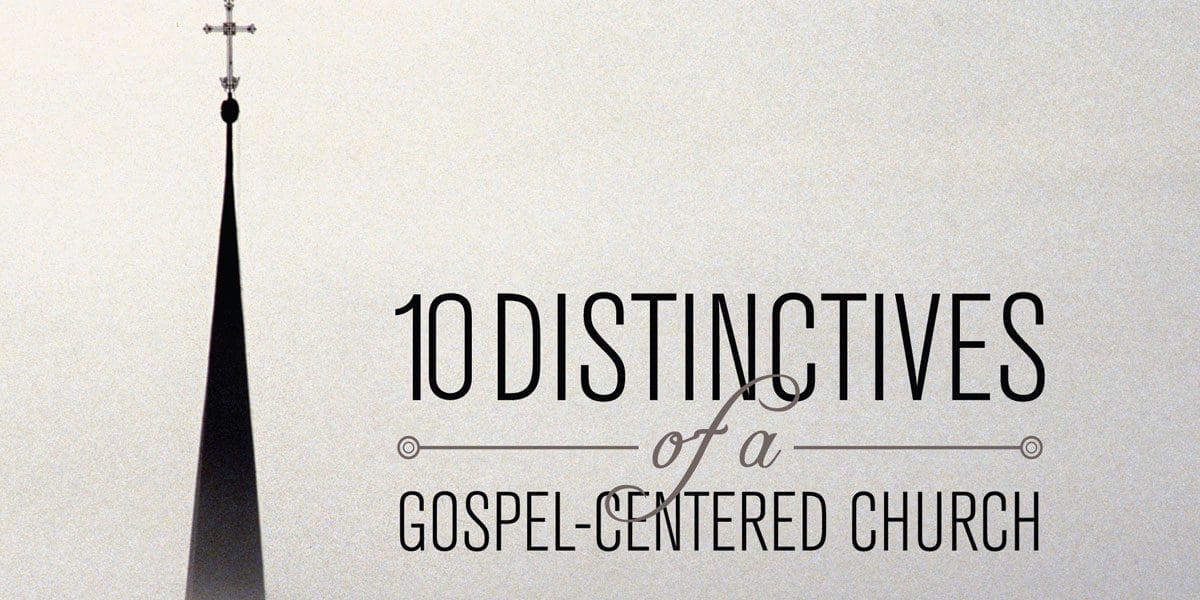Stay there in Ephesus so that you may command certain men not to teach false doctrines any longer nor to devote themselves to myths and endless genealogies. These promote controversies rather than God’s work—which is by faith. The goal of this command is love, which comes from a pure heart and a good conscience and a sincere faith. Some have wandered away from these… 1 Timothy 1:3-6 (NIV)
The idea for this series was planted in my mind October of last year at Outback Steakhouse. I was there with a friend, who’s a mentor to me in many ways. I told him about what was happening in the church and the many ways I felt we were seeing the blessing of God.
As we got into the meal, he asked me “Colin, what do you think is the most important thing you need to do right now as Senior Pastor of The Orchard?”
I gave him some answers, and then did what I usually do in the company of wise people. I asked him “What do you think?”
“You need to spell out what it means to be a Gospel-centered church,” he said.
“How would I do that?”
“You identify The Orchard’s distinctives, then you find a text that speaks to each of them and lay it out.”
I said “Honestly, I don’t think I can do that.”
There is a big difference between starting with a message and finding Scripture to support it, and starting with the Scripture and letting it give you the message.
We enjoyed the steak and moved on to talk about other things. A few weeks later Karen and I took a few days and went up to Door County. We wanted to set aside some time for reading and prayer, so I said “Let’s read a bible book together.” Since we only had three days, we wanted something short. Karen said “What about 1 Timothy?”
Half way through the letter, Paul tells us what 1 Timothy is about:
“Although I hope to come to you soon, I am writing you these instructions so that, if I am delayed, you will know how people ought to conduct themselves in God’s household, which is the church of the living God, the pillar and foundation of the truth.” 1 Timothy 3:14-15 (NIV)
This whole letter has been given by God to tell us what he is looking for in the church. 1 Timothy does exactly what my friend had been saying I need to do. It spells out what we are to pursue, how we are to behave, and what we are to be about.
People talk all the time about what they are looking for in a church. But what is God looking for in a church? That’s what we should be asking. Not “What do I want of the church?” But “What does God want from us?”
We start with the Bible
I give you that background because the way in which this series was conceived tells you something important about The Orchard. It’s not for us to decide what’s important and then look for Bible texts to support our passion. We start from the Bible, where God tells us what is important to Him, so that we can follow after His passion.
We are never the masters of this Word. Our desire is that we should be mastered by the Word. We want to be shaped by the Scriptures. So, we place ourselves under the Word. We’re not over the Word, selecting what we like and ignoring what we don’t.
We want the Bible to be our critic. We want it to tell us what The Orchard should be. We want it to rebuke us, to correct us, and to change us. The true church, the gospel church is always reforming. Otherwise, we are listening to the echo of our own voices. The god we worship is only a projection of ourselves.
Living under the Lordship of Christ means that you come to His Word without preconditions. You come with a Spirit that says “What You say, we will follow—so help us God!”
When we talk about these “10 Distinctives for a Gospel-Centered Church,” please understand that we do not come to the Scriptures thinking that we’ve got it all worked out. We come to the Scriptures to find out what matters to God so that we can pursue his passion.
The Bible is God’s revelation
“Paul, an apostle of Christ Jesus by the command of God our Savior and of Christ Jesus our hope” 1 Timothy 1:1 (NIV)
Paul is an apostle of Christ Jesus. Apostle means “one who is sent.” He was sent directly by Christ—like an ambassador speaking on behalf of a government. That makes him different from any of the rest of us. Paul was an apostle “by the command of God.” That’s an extraordinary statement.
I have the privilege of serving as your Senior Pastor. I could describe myself as “Colin, a senior pastor,” but I could never say “by the command of God.” The best I could say would be “Colin, a senior pastor, because you guys invited me to come.”
Of course, I have discerned God’s hand and his calling in that, but it did not come by direct revelation. Paul’s apostleship did! He was an apostle, and that means he was sent “by the command of God.”
No pastor could ever say “I am here by the command of God.” No missionary can say that. But Paul did! Christ appeared to him. God appointed Him as the Apostle to the Gentiles.
We serve under the authority of the Word and under the authority of others God places over us. But Paul was given authority as an apostle of Christ Jesus, by the command of God. As soon as people start talking as if they have a hotline to God, they’re off base. They’ve lost connection with the head.
The uniqueness of the apostles and prophets is that God spoke to them directly. God’s word does not come to us directly. It comes to us through the apostles and prophets. When we read this letter we are not listening to the opinions of Paul, we are hearing the Word of God, the will of Christ.
These are the words of the Apostle, sent by “God our Savior” and “Jesus Christ our hope.” That’s marvelous: God saves. Jesus Christ is our hope. Whatever you are facing, there is hope for you in Jesus Christ today. This whole letter is full of Christ.
This letter is for the whole church. It was read publicly, so it is for the whole congregation. But it begins with a personal word to Timothy, who was pastor of the church in Ephesus.
A Personal Word to the Pastor
“As I urged you when I went into Macedonia, stay there in Ephesus.” 1 Timothy 1:3 (NIV)
The church at Ephesus had been planted in great difficulty. You can read about it in Acts 19. When Paul preached in Ephesus there was a riot. But people came to Christ and the church was planted.
Paul had great affection for this church. He spent three years in this city. When he left, he gathered the leaders and said:
“I know that after I leave, savage wolves will come in among you and will not spare the flock. Even from your own number men will arise and distort the truth in order to draw away disciples after them. So be on your guard! Remember that for three years I never stopped warning each of you night and day with tears.” Acts 20:29-31 (NIV)
He tells the elders that leaders need to protect the church from people who would make the church more about themselves than about Christ. That’s what Timothy had to do: “Stay in Ephesus—so that you may command certain men not to teach false doctrines any longer” (v3).
Should I stay or should I go?
Here’s a practical question. God gives you a job. God gives you work to do. You get involved in a ministry. When should you persevere in a ministry, and when should you consider moving on to something else? That’s a big question, and there are many factors.
- Stay when other people need to be protected. “Savage wolves will come in among you…” (Acts 20:29). The one who runs away when the wolf comes is just a hired hand. The shepherd stays even if it means giving his life for the sheep (John 10:11-13).
- Stay when you can help bring God’s people together. Paul says “the goal of this command is love” (v5). As long as you can contribute to the unity of the body, you have reason to stay.
- Stay when you can have a redemptive influence in people’s lives. Timothy’s aim was not to exclude these difficult people, but to win them for Christ.
- Stay as long as there is a great work to be done. Timothy needed this word. There were some pretty difficult people in that church at Ephesus, and there must have been times when Timothy wanted to go somewhere else. Paul says “Stay! There is a great work for you to do.”
Guard the gospel
“Stay in Ephesus, so that you may command certain men not to teach false doctrines.” 1 Timothy 1:3 (NIV)
When Paul speaks about “false doctrines,” it shows that right from the earliest days of the church, there were doctrines taught by the apostles and received by the churches as true.
The Scriptures speak about this in many different ways:
“…the faith that was once for all entrusted to the saints.” (Jude 3)
“…the pattern of sound teaching.” (2 Tim 1:13)
“…the good deposit that was entrusted to you” (2 Tim 1:14)
If you want it in a word: “The gospel.”
Timothy, here’s what you need to do: Guard the gospel. Keep it front and center in the church. Preach the gospel, Timothy. Live the gospel. Advance the gospel. And if necessary, Timothy, die for the gospel. That is the trust that is given to you. This is the trust that has been given to every pastor, every elder and every believer.
Protect the Church
“Certain men… devote themselves to myths and endless genealogies.” 1 Timothy 1:3 (NIV)
The word “myths” simply means stories. Paul is describing men in the church who love to tell stories. That’s what some congregations want their pastors to do: “Tell us stories.” Stories that make people feel good, and stories that make people cry—chicken soup for the soul.
There are men who devote themselves to telling stories. They love this stuff, and their people love it too. But only the shallowest spiritual life grows under this kind of ministry.
When Paul talks about “endless genealogies,” evidently that means there was great interest in what lineage you came from. You can see why that would be of special interest, especially to Jewish believers, tracing their line back to Abraham and other great men of the faith.
The New Testament begins with a genealogy that leads to Jesus Christ. But these genealogies are endless. The trouble with an endless genealogy is that it never gets to Jesus Christ, and their fascination with it actually keeps them from Christ.
I was struck by a comment made by Don Carson recently. Dr. Carson has served for many years as a distinguished professor at Trinity University. “I have learned over the years that students don’t learn what I teach. They learn what I am excited about.” Your kids will not learn what you teach. They will learn what you are excited about.
Here’s the problem. There are many people who believe in Jesus. But their lives have never been gripped by a passion for the Gospel. They are bored with their faith, and they are looking for something else to get excited about.
Don’t let division spread
“These promote controversies rather than God’s work which is by faith.” 1 Timothy 1:4 (NIV)
Here’s what causes strife and division in churches: A few people have a particular passion. They want the whole church to embrace their passion. They want the church to be about what they are about. That always leads to division.
I draw this conclusion: If Jesus Christ is not the center of your affection and your passion, you will become a divisive person in the church. The Church can only be about one thing—the person and work of Jesus Christ.
Paul says “May I never boast in anything except Jesus Christ and Him crucified” (Galatians 6:14). May this church never become about anything except Jesus Christ and Him crucified, because if it was it would be destructive to the Church of Jesus Christ.
Brothers and sisters, we are not here for ourselves. We are not here to advance our own cause or ministry or passion. We are here for Christ! For the Gospel! Timothy, don’t let anyone move the church away from that. Nobody! Never!
Let the gospel spread from the center
“The goal of this command is love.” 1 Timothy 1:5 (NIV)
The command is not to teach false doctrines, myths and endless genealogies. The goal of this command is love! In other words, the only way in which you can have real unity among God’s people is by keeping Jesus Christ and His gospel at the center. As soon as anything else takes center stage, you have controversy and division.
Next weekend will be the beginning of my 30th year as a pastor. It has been my privilege to serve two wonderful churches on two continents. I can honestly say that I have never experienced a pastoral staff, and board, and congregation as united as our church is today.
I say that to the praise and glory of God. Then why in the world are you preaching this stuff? Because we need to build on it. We need to know how to guard it, how to feed it, and how to extend it by keeping the Gospel front and center.
We want to put down deep roots into God’s Word. We want to grow in our life in Christ. We want to bear fruit around the world. We want to be a church that keeps Jesus Christ front and center. That’s the first distinctive of a Gospel centered church:
A Gospel-Centered Church is…
…Rooted in Truth and Growing in Love
We want to be about God our Savior and Jesus Christ our hope—rooted in Christ’s truth, and growing in Christ’s love. Nothing more, nothing less, nothing else. What will it take to keep us rooted in the truth? What will it take to keep us growing in love?
Some will be distracted
“Some have wandered away… and turned to meaningless talk.” 1 Timothy 1:6 (NIV)
It’s very rare that anyone ever decides to abandon the truth. What happens much more often is that people wander. It happens gradually. It happens when you do not have any particular goal. You lose your moorings and you drift.
You don’t want to be that person. So, you need to be alert to the danger. You may know someone who is wandering and God may use you to bring a wanderer back and help them get rooted in the truth.
Look for the warning signs
There are four warning signs that a person is in danger of wandering away from the truth. These questions will help you to see the signs:
1. Am I always looking for something new?
If that’s true of you, you are in danger of wandering. That’s what the myths and endless genealogies were—something new. People who are deeply rooted in Christ are satisfied in Him. If you were deeply rooted, you would have found contentment in Him—as millions of people have.
2. Do I like to talk while avoiding action?
“They have turned to meaningless talk.” 1 Timothy 1:6 (NIV)
These folks go on and on about how we should do this and how we ought to be doing that, but as it turns out, their pious talk masks an unholy life. If you see the Bible as a book of ideas to be discussed rather than truth to be obeyed, you are just the kind of person who wanders from the truth.
3. Do I want to teach more than I want to learn?
“They want to be teachers.” 1 Timothy 1:7 (NIV)
These folks want a position in the church. They want to be teachers more than they want to learn. If you love to teach, but you do not love to learn, you are in danger of wandering away from the truth.
4. Does my confidence exceed my knowledge?
“They want to be teachers of the law but they do not know what they are talking about.” 1 Timothy 1:7 (NIV)
These men are supremely confident, big voices that carry a lot of weight, but Paul says they do not know what they are talking about. I’ve seen this many times. A man who has only a shallow root in the truth reads a book or hears a talk and gets excited about it. Suddenly he feels, with that little bit of knowledge, that he knows more than his teachers. He knows what the church needs, what it should be doing.
He feels he should be given a platform for what he has discovered. But when people don’t buy his discovery, he becomes dogmatic, angry and belligerent. He feels that he’s the only one who really sees the truth. What he doesn’t see is that he is wandering away from the truth.
How to return from your wandering
“The goal of this command is love, which comes from a pure heart and a good conscience and a sincere faith, some have wandered away from these…” 1 Timothy 1:5-6 (NIV)
How can we stay rooted in truth and keep growing in love? Paul tells us that “Love which comes from…” (v5) Where does love come from? How does love grow? How can you become a loving person, and not a divisive person at work in your home and in the church?
1. Love comes from a pure heart
The word “pure” means undivided. James says “the double-minded man is unstable in all his ways” (James 1:8). Ask God to give you a pure heart. “Set your heart on things above where Christ is seated” (Colossians 3:1). Ask God to give you a stronger faith in Christ and a deeper love for Christ, a firmer hope in Christ. Then you will be able to love. Love comes from a pure heart
2. Love comes from a good conscience
A good conscience is one that’s at rest with God. Is there a sin that you have allowed to remain in your life? Your conscience is not at rest. You are fighting all the time. It’s making you an angry person, a divisive person. It’s the root of your complaining spirit.
Can you see what a blessing it would be for you to come clean with Christ today? To lay what you have been carrying at the feet of Jesus, who died for you? To be washed and to receive a clean conscience? Then you would be able to love! Love comes from a good conscience.
3. Love comes from a sincere faith
Sincere faith means that you really trust Christ. You don’t just talk about trusting Him. You trust Him! You trust Him, whatever is happening in your life. You trust Him when you lose a job, you trust Him when you find a job. You trust Him at the wedding and you trust Him at the funeral. You trust Christ!
“The trials of your life prove that your faith is genuine” (1 Peter 1:7). Do you remember what Peter says next? “Though you have not seen Him you love Him.” Love comes from a sincere faith.
The Lord Jesus Christ can give you a pure heart, a clean conscience and a sincere faith. That’s why He died, and that is why He is alive!
If you receive these gifts today you will be able to love! You will be able to love your wife. You will be able to love your children and your parents. You will be able to love your enemies, and you will have love for the church. Most of all you will love the Lord Jesus Christ who loved you and gave Himself for you.
That’s the transforming power of the gospel. Lord, make us a church that is increasingly rooted in truth and growing in love for the praise and glory of Jesus Christ—till He comes again. Amen.





